Marlee Matlin, Geena Davis Celebrate Diversity Wins and Next Steps at The Hollywood Reporter’s ‘Raising Our Voices’ Luncheon
- Oops!Something went wrong.Please try again later.
- Oops!Something went wrong.Please try again later.
- Oops!Something went wrong.Please try again later.
- Oops!Something went wrong.Please try again later.

“I’m so grateful that I’m not alone any longer,” CODA star Marlee Matlin told the audience at The Hollywood Reporter‘s inaugural “Raising Our Voices: Setting Hollywood’s Inclusion Agenda” luncheon Wednesday.
Introduced by her CODA co-star, Troy Kotsur — who last month became the second deaf Oscar winner ever following Matlin’s historic win 35 years ago — Matlin delivered the keynote address at the event, which also featured appearances by Daniel Durant, Geena Davis, Wilmer Valderrama, Natalie Morales and Gloria Calderón Kellett.
More from The Hollywood Reporter
The event, presented by Walmart, brought together some of the industry’s most influential and inspiring executives, storytellers and thought-leaders for a series of discussions on the state and future of Hollywood’s diversity, equity and inclusion movement.
THR editorial director Nekesa Mumbi Moody kicked off the luncheon, held at The Maybourne Beverly Hills Hotel, alongside activist and producer Bird Runningwater and IllumiNative president and CEO Crystal Echo Hawk. After welcoming the room, Runningwater paid respects to the “Tongva People, who are the ancestral custodians of the land that we are gathered on today” and acknowledged the “Chumash and Tataviam tribes who are also the traditional keepers of the land out on the coast and in the valley, respectively; lands where many of our entertainment community live and work.” Echo Hawk added that L.A. County alone has the highest population of Native peoples in the United States.
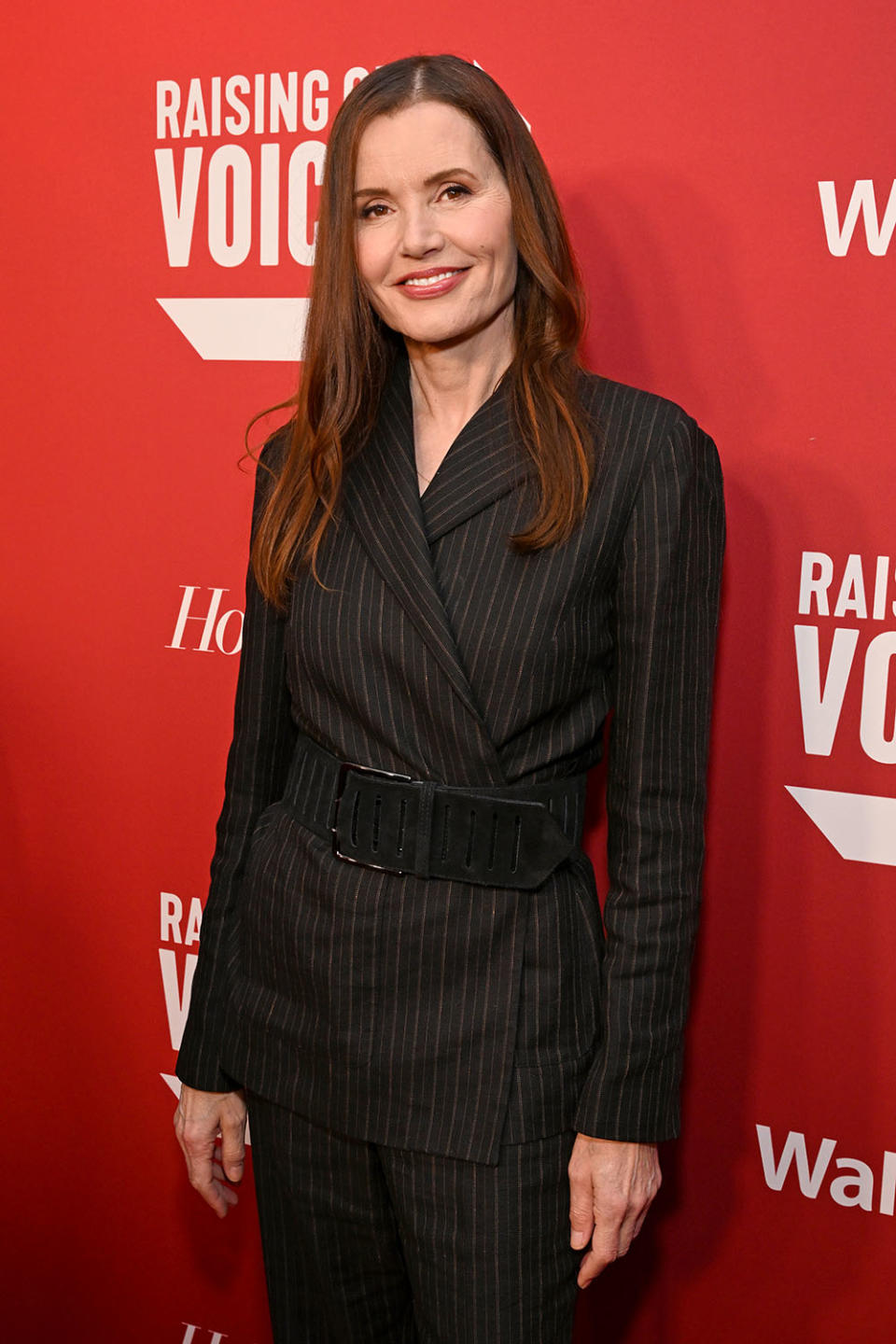
Michael Kovac/Getty Images for The Hollywood Reporter
Davis, founder of The Geena Davis Institute on Gender in Media, followed up the introduction with her own remarks, explaining how she began her fight for onscreen female representation after watching children’s shows when her daughter was young and was stunned to see the imbalance of male versus female characters.
“It was studying children’s and animated content that first led me to ask: ‘Why are we doing this? Why are we, from the very beginning, showing that boys are more important than girls?'” Davis remembered. “I didn’t intend to be a visionary, but I couldn’t find anyone else in the industry who saw what I was seeing.”
After explaining the extensive data her institute has complied, Davis added, “While we have seen the number of female characters in lead roles in film and TV increase, and some very good movement toward more content featuring or created by people of color, members of other underrepresented groups are by no means reflective of our real-world population,” including people with a disability and behind the camera. “More space needs to be created in film and television for these voices,” she said, adding that issues in onscreen representation can be fixed overnight.
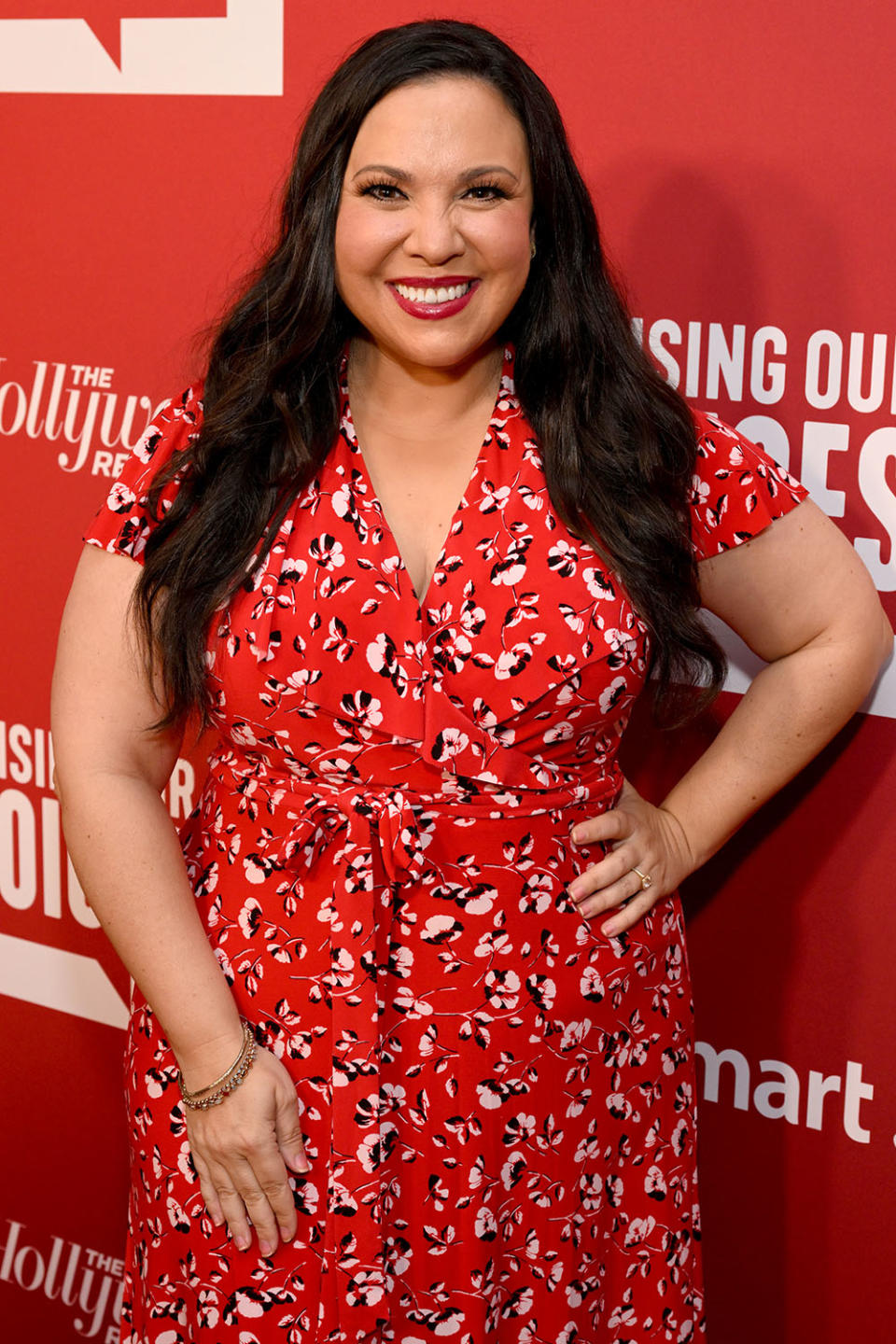
Getty Images
Walmart chief creative officer Jean Batthany also took the stage to talk about the company’s commitment to equity; THR senior editor of diversity and inclusion Rebecca Sun was then joined by Yalda Uhls, assistant adjunct professor and founder of UCLA’s Center for Scholars and Storytellers, to break down diversity, equity and inclusion by the numbers. Uhls said her group found that movies can lose up to 18 to 82 percent of their production costs if they don’t have authentically inclusive representation, adding up to a possible $130 million, and called on the industry to “truly embrace what the audience wants, make sure that we all feel seen,” as well as allowing execs to take risks and follow their diverse passion projects.
“The power of authentic and inclusive storytelling is powerful, and our research shows it will impact the bottom line,” she added. “No more excuses.”
Valderrama; Calderón Kellett; Alex Schmider, producer and GLAAD director of transgender representation; Latasha Gillespie, head of global diversity, equity and inclusion at Amazon Studios, Prime Video and Freevee; Sharoni Little, head of global inclusion strategy at CAA; and Samata Narra, senior vp equity and inclusion, content strategy at Warner Bros Discovery, then took part in a panel on the state of inclusion in Hollywood, moderated by journalist Stacey Wilson Hunt.

Stefanie Keenan/Getty Images for The Hollywood Reporter
As each panelist broke down their experiences with industry diversity and the path forward they each saw, Valderrama said: “I think the message is it’s OK to not know how to do something and allow us to help you. Ultimately we come full circle to a conversation where for the first time, we’re being brought into the table to collaborate. The secret to the revolution of content is going to come in the form of a creative collaboration.”
One Day at a Time and With Love showrunner Calderón Kellett also recalled her early days as a writer when she was both the only woman and the only person of color, noting that things have gotten better.
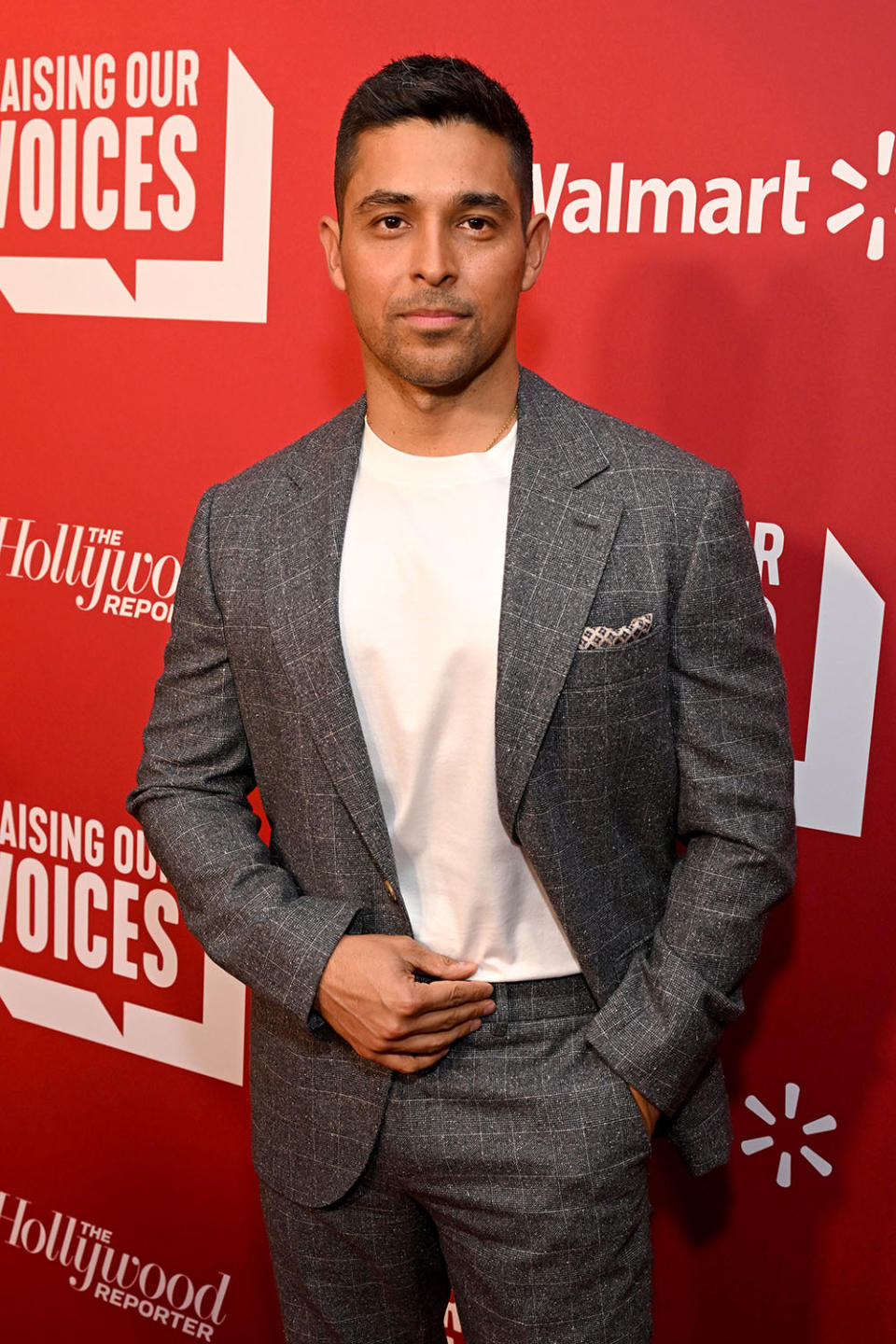
Michael Kovac/Getty Images for The Hollywood Reporter
“They’re understanding the importance of this work,” she said, pointing to Norman Lear for being a big force behind the change and yet noting that there’s much more work to be done. “Is it getting better in the rooms? Yes. Is there enough on television? No, there’s not. I think Hollywood is very quick to pat themselves on the back. I don’t see one Latino family on network TV right now. Thank god for Wilmer, he’s on TV. Or else I wouldn’t see a lot of brown faces that are positive, that are doing great things. So this work is so, so, so important.”
The panel was followed by an inclusion spotlight on the Ghetto Film School and WOCstar Capital. Walmart execs Tony Waller and Julie Gehrki made remarks, followed by a short speech by Raya and the Last Dragon director Carlos Lopez Estrada, who has been involved with Ghetto Film School since 2015.
“The training that these students receive, it doesn’t only make them great, technically trained, skillful filmmakers,” Estrada said. “It also allows them to be more confident, allows them to grow into their own voices, better collaborators, and passionate, opinionated troublemakers in the good sense and original artists with very important things to say.”
Richie Siegel, president and co-founder of the Inevitable Foundation, and Nic Novicki, founder and director of the Easterseals Disability Film Challenge, then spoke about disability visibility, as Siegel revealed that disabled people make up around 20 percent of the U.S. population but represent less than one percent of talent in the industry. And despite these numbers, he said, “when we talk to DEI leaders about these problems, we hear things like ‘we are busy with race and gender, we don’t have time for disability.'”
In response, Siegel’s organization is launching a Disability Is Diversity campaign and is focused on eliminating industry excuses for low disability representation and bringing more people to the table. Novicki echoed much of the same, speaking about the success of his film challenge and calling on every person in the room to “see us as a crucial piece of the inclusion puzzle; see us as viable employees, as cast and as crew members and creatives; and most importantly, think of us as people whose stories deserve to be told.”
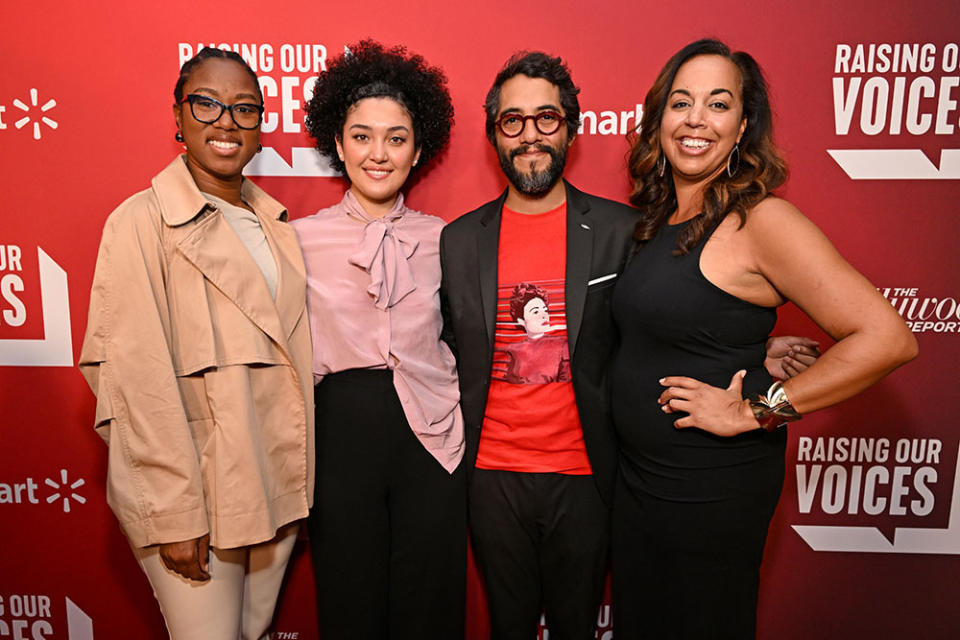
Michael Kovac/Getty Images for The Hollywood Reporter
To finish out the event, Kotsur introduced Matlin ahead of her keynote, but first teased Davis for years ago telling him she would take a photo with him, which never came to be, declaring that the time had finally come. Davis ran up to the stage to take a picture on the spot, as Matlin captured it on her phone. He also joked, “Before I was a famous award-winning actor, I used to buy clothing at Walmart, so I’d like to thank our sponsor Walmart — you provided me with so many pairs of socks and underwear over the years, I really appreciate it.”
Turning his attention to Matlin, Kotsur said that for years, including after her Academy Award win for Children of a Lesser God, “Marlee seemed like the only deaf actress in the world. Sometimes she was the token deaf actress. Marlee dealt with discrimination, barriers and closed-mindedness with such patience, elegance and grace. Marlee never gave up,” he said, thanking her for keeping “my hope and the hope of the Deaf community alive.”
Matlin joined Kotsur on stage, acknowledging that she wasn’t alone anymore after his Oscar win last month, and remembered back to being a young actress facing discrimination, deciding that “if I wanted to continue to be an actor who happened to be deaf in Hollywood, I couldn’t just sit there; I had to make noise, I had to collaborate and I had to make things happen for myself. Most importantly, I had to speak out about those who wished to handicap me and the community I represented.” That was affirmed recently, she said, when meeting with President Joe Biden at the White House and learning of his similar struggles with speech and a stutter.

Michael Kovac/Getty Images for The Hollywood Reporter
Thinking back on CODA‘s historic best picture win, Matlin described, “How wonderful it was that our film really busted out the myth that no one wanted to see a family-friendly film, without special effects, or a coming-of-age story of a young girl and her working-class deaf family. With open captions! Thank you [director] Sian [Heder] for that. And that we were on the stage, the cast, the director, the producers and our interpreters for everyone to see, showing that we could do it. That inclusion and authenticity and accessibility can be entertaining and creatively and commercially successful.”
She added, “It’s hard to imagine any executives these days that will have the ability to finance a film or studio who can greenlight a project after what we succeeded, saying, ‘Well, how do we do it?” calling on those who rattle off excuses to not hire authentically deaf or disabled talent because of the supposed difficulty to “figure it out.” Referring to the three-decade gap between her and Kotsur’s wins, she said, “I know that this time it won’t be another 35 years. And in closing, the star told the crowd, “As I looked to an earlier generation like Linda Bove and Bernard Bragg, who inspired me, and as Troy and Daniel have said that I inspired them, we hope that you can look to us as one of thousands of artists who are deaf or disabled to inspire you to ensure that the future of diversity, equity, inclusion, accessibility and authenticity in Hollywood is a success.”

Stefanie Keenan/Getty Images for The Hollywood Reporter
This event was held in compliance with local health and safety guidelines. For more on THR’s “Raising Our Voices” initiative, click here.
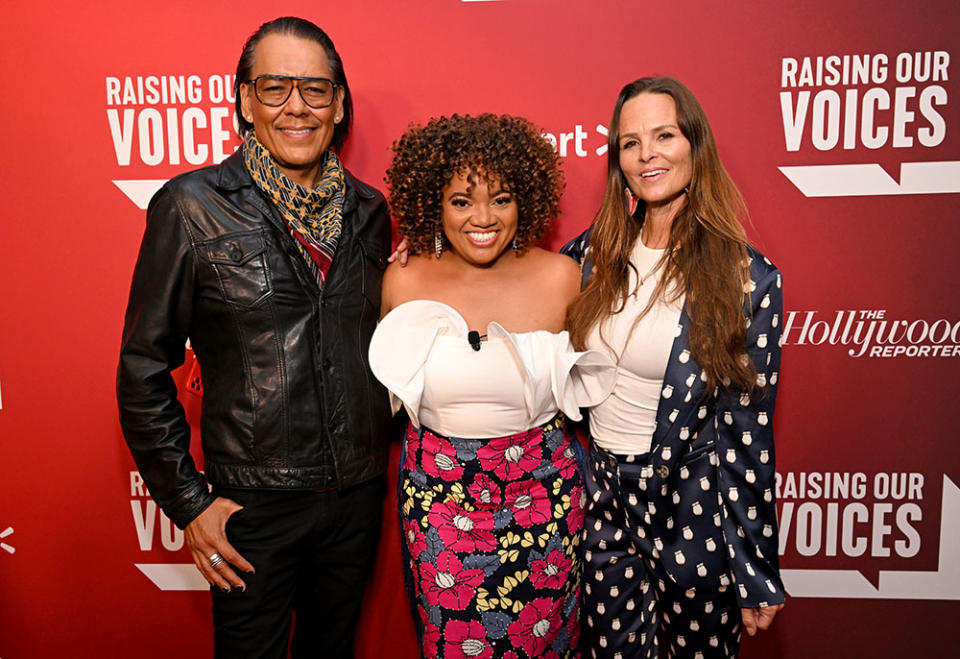
Michael Kovac/Getty Images for The Hollywood Reporter
Best of The Hollywood Reporter

